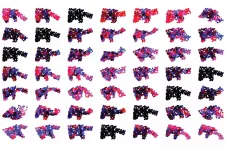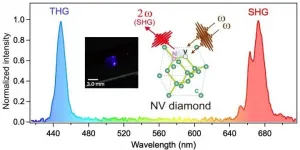(Press-News.org) "You have to win the battle against depression", "what counts is not surrendering" and "this is not a short road" are examples of conceptual metaphors typically used to describe experiences and issues associated with disorders like depression. Such expressions allude to abstract concepts but do so using familiar terms that enable better understanding of the experience. This kind of metaphor is often used unconsciously, going unnoticed by both speaker and listener. However, the study of metaphors can help access and understand the thinking, beliefs and feelings of individuals with mental disorders.
The conceptual metaphors of depression found in 23 blogs written by people with major depressive disorders were analysed by a multidisciplinary UOC team composed of Marta Coll-Florit and Salvador Climent Roca - professors from the Faculty of Arts and Humanities, both members of the GRIAL-UOC group - and Eulàlia Hernández, a professor from the Faculty of Psychology and Education Sciences and researcher in the PSiNET group. Recently published open-access in Metaphor and Symbol, the article is the first of its kind to analyse Catalan texts and is also one of the few studies that focuses on content written spontaneously online. In relation to the experience of depression, the results signal the importance of social factors, the surroundings and especially medical practice; they also point to the usefulness of blogs as an outlet for expressing and understanding the experiences of people with depression.
The research is part of the MOMENT project on mental disorder metaphors, in which linguists, psychologists, medical anthropologists, social educators and engineers are working together to study conceptual metaphors from the mental health field. As explained by the researchers: "The mental disorder experience is difficult to communicate given the associated abstractness, but studying cognitive metaphors can enhance understanding of mental health, contribute to more accurate and respectful public discourses and facilitate communication between professionals and patients."
Metaphors do not depend on specific languages
The research involved an exhaustive and quantified analysis of the main types of metaphors used by people affected by depression. Findings were then compared with previous studies with a view to identifying differences in expression in a new textual genre and a different language. The research not only analysed the metaphors of depression, but also metaphors related to the experience of living with a severe mental disorder, specifically in terms of symptoms, medication, communication and emotions.
The results confirm those of studies carried out in other languages - mainly English - showing, according to the researchers, "that, significantly, the metaphors are conceptual and intercultural, that is, they do not depend on a specific language." Among the more common expressions used to speak of depression and the associated emotions, the authors highlight the notions of fall, containment and darkness, of life with depression as a fight against obstacles and of the disorder itself as a malignant agent.
"In general, the metaphors reveal that affected individuals have positive perceptions of situations that allow them agency, that is, control over their lives and emotions, and negative perceptions of situations that deny them that agency. The metaphors of struggle are thus not always negative," continued the researchers, "as they are positive if they reinforce agency. Also positive are metaphors that perceive life with a disorder as a journey to a better situation; however, the journey metaphor can be negative if the affected person feels they have no control over the journey."
Medical practice as the enemy
The researchers have identified metaphors not featuring in previous studies, mostly corresponding to social, communicational and medical factors. They say that expressions referring to being "locked" in a diagnosis, describing prejudice as a "stone slab" and the appointment with the psychiatrist as an "interrogation" point to key factors that worsen the experience of living with depression. They further underlined how "these metaphors reflect a rejection of various social and environmental conditions, such as those associated with stigma, non-communication and medical professionals, often considered more an enemy than an ally."
Most metaphors regarding medical aspects are highly critical of psychiatry and the medical system in terms of limiting the patient's capacity for agency. "The results are not exactly flattering for the professional," according to the authors, who suggest that "the therapy relationship between the patient and the professional is clearly something that needs working on."
According to the researchers, a plausible explanation for this negative perception is that the bloggers analysed have gone through a healthcare system that is more focused on the problem than on the person. Patients consequently "seek more empathy and understanding of their suffering from medical staff". Professionals working in any communication field related to mental health disorders need to be aware of and understand the expressive power of conceptual metaphors and the importance of social and contextual factors in the lives of patients.
A textual genre that allows for free expression
The researchers have linked the discovery of the new types of metaphors to blogging, because expressing oneself online is more spontaneous than in clinical settings. "Blogs, being a kind of first-person non-mediated text," they underlined, "allow people to explain what is more intimate and more critical for them and what most deeply affects them."
This openness can also be a tool to raise awareness of mental disorders, according to the authors, as it can help "society better understand what it means for people with diagnoses of mental disorder to live with depression, what their experience of the disorder is beyond 'feeling sad' and so contribute to the fight against stigma."
Reflecting on how we talk about mental disorders
As well as depression, the MOMENT project has been exploring other major disorders such as schizophrenia, obsessive compulsive disorder and bipolar disorder, as well as other media, such as Twitter. To help improve understanding of mental disorders, the researchers have been analysing the discourse not only of patients but also of mental health professionals. They summed it up saying "The idea is to detect and systematize the predominant ideas and assumptions about severe mental disorders, to encourage reflections on how disorders are talked about and how they should be talked about and, ultimately, to promote change in relation to metaphors that can create stigma."
INFORMATION:
This UOC research promotes Sustainable Development Goals (SDGs) 3 (good health and well-being) and 10 (reduced inequalities).
This research has received funding from the State Research Agency (AEI) and ERDF [FFI2017-86969-R].
Reference to article
Coll-Florit, M., S. Climent, M. Sanfilippo, E. Hernández (2021). "Metaphors of depression. Studying first-person accounts of life with depression published in blogs". Metaphor and Symbol, 36:1, 1-19. DOI: https://doi.org/10.1080/10926488.2020.1845096
UOC R&I
The UOC's research and innovation (R&I) is helping overcome pressing challenges faced by global societies in the 21st century, by studying interactions between technology and human & social sciences with a specific focus on the network society, e-learning and e-health. Over 500 researchers and 51 research groups work among the University's seven faculties and two research centres: the Internet Interdisciplinary Institute (IN3) and the eHealth Center (eHC).
The United Nations' 2030 Agenda for Sustainable Development and open knowledge serve as strategic pillars for the UOC's teaching, research and innovation. More information:research.uoc.edu. #UOC25years
The results argue for a comprehensive approach to disease prevention. The scientists have now published their findings in the journal Nature Medicine.
Many elderly people suffer simultaneously from several, frequently very different diseases, a condition also known as multimorbidity. Their quality of life is severely restricted, and they receive medication from different doctors, a process which is difficult and often insufficiently coordinated. Observations indicate that certain diseases commonly occur together, but the causes of this are largely ...
It's well known that mentoring opportunities are critical for development and career advancement, and are associated with greater job satisfaction and increased earnings and promotions.
Yet a recent study co-authored by RMIT University's Professor Andrew R. Timming found women may be missing out on these opportunities due to fears by male managers of potential misconduct allegations.
"Workplace relations between males and females have changed over the past two years. Male managers are significantly less likely than female managers to mentor or interact one-on-one with female employees," Timming said.
"We found that male managers were less likely to work one-on-one in an office with the door closed and less likely to have ...
WASHINGTON, March 22, 2021 -- What's better at finding a hidden bomb -- a dog or an electronic chemical detector? In this episode, the Reactions team travels to the U.S. Naval Research Laboratory to find out: https://youtu.be/TRwqOFHOjac.
INFORMATION:
Reactions is a video series produced by the American Chemical Society and PBS Digital Studios. Subscribe to Reactions at http://bit.ly/ACSReactions and follow us on Twitter @ACSReactions.
The American Chemical Society (ACS) is a nonprofit organization chartered by the U.S. Congress. ACS' mission is to advance the broader ...
March 22, 2021 (BRONX, NY)-- Most people with cancer who are infected by the novel coronavirus produce antibodies at a rate comparable to the rest of the population--but their ability to do so depends on their type of cancer and the treatments they've received, according to a new study by researchers at Montefiore Health System and Albert Einstein College of Medicine. The findings, published online today in Nature Cancer, may lead to better care for cancer patients, who face a heightened risk of dying from COVID-19, and suggests that cancer patients should ...
PHILADELPHIA--Hormone drugs that reduce androgen levels may help disarm the coronavirus spike protein used to infect cells and stop the progression of severe COVID-19 disease, suggests a new preclinical study from researchers in the Abramson Cancer Center at the University of Pennsylvania and published online in Cell Press's iScience.
Researchers show how two receptors--known as ACE2 and TMPRSS2--are regulated by the androgen hormone and used by SARS-CoV-2 to gain entry into host cells. Blocking the receptors with the clinically proven inhibitor Camostat and other anti-androgen therapies prevented viral entry and replication, they also showed in lab studies.
The findings provide more insight into the molecular mechanisms of the virus but also support ...
There are some tasks that traditional robots -- the rigid and metallic kind -- simply aren't cut out for. Soft-bodied robots, on the other hand, may be able to interact with people more safely or slip into tight spaces with ease. But for robots to reliably complete their programmed duties, they need to know the whereabouts of all their body parts. That's a tall task for a soft robot that can deform in a virtually infinite number of ways.
MIT researchers have developed an algorithm to help engineers design soft robots that collect more useful information about their surroundings. The deep-learning algorithm suggests an optimized placement of sensors within the robot's body, allowing it to better interact with ...
Tsukuba, Japan - Researchers from the Department of Applied Physics at the University of Tsukuba demonstrated second-order nonlinear optical effects in diamonds by taking advantage of internal color center defects that break inversion symmetry of diamond crystal. This research may lead to faster internet communications, all-optical computers, and even open a route to next generation quantum sensing technologies.
Current fiber optical technology uses light pulses to transfer broad-bandwidth data that let you check your email, watch videos, and everything else on the Internet. The main drawback is that light pulses hardly interact with each other, so the information must be converted into electrical signals to allow your computer ...
In a recent study testing the effects of exercise on overall metabolism, researchers at Oregon State University found that even a single session of moderate aerobic exercise makes a difference in the cells of otherwise sedentary people.
Mitochondria are the part of the cell responsible for the biological process of respiration, which turns fuels such as sugars and fats into energy, so the researchers focused only on mitochondria function.
"What we found is that, regardless of what fuel the mitochondria were using, there were mild increases in the ability to burn off the fuels," said Matt Robinson, lead author on the study and an assistant professor ...
Melbourne researchers have revealed how melanoma cells are flooded with DNA changes as this skin cancer progresses from early, treatable stages through to fatal end-stage disease.
Using genomics, the team tracked DNA changes occurring in melanoma samples donated by patients as their disease progressed, right through to the time the patient died. This revealed dramatic and chaotic genetic changes that accumulated in the melanoma cells as the cancers progressed, providing clues to potential new approaches to treating this disease.
The research, published in Nature Communications, was led by Professor Mark Shackleton, Professor Director of Oncology at Alfred Health and Monash University; Professor ...
Clinically, multiple lines of evidence show that chronic pain and depressive symptoms are frequently encountered. Patients suffered from both pain and depression are likely to become insensitive to drug treatment, indicating a refractory disease. The neural mechanism under this comorbidity remains unclear.
In a study published in Nature Neuroscience, the research team led by Prof. ZHANG Zhi and Dr. LI Juan from the University of Science and Technology of China (USTC) of the Chinese Academy of Sciences (CAS), reported the discrete thalamocortical circuits underlying the pain symptom caused by tissue injury and depression-like states.
Being the gateway towards cerebral cortex and considered as the major source of 'nociceptive ...






